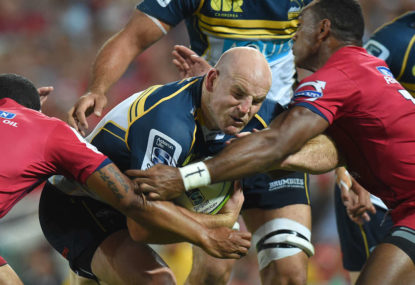Worried your side may not have enough points to make the finals? Fear not, the current conference system perhaps has little to do with who are the best sides of the season that deserve to make the finals.
Rather, as Wynn Gray of the New Zealand Herald so aptly pointed out, “Conference systems reward political and commercial partners rather than performance. Geography decides which teams get a free pass to the playoffs.”
It seems ridiculous that one side of the South African conference play no New Zealand sides, while Australian teams must endure playing five teams from the strongest nation.
Gray also argues that because the conference system is not a round-robin affair, New Zealand will still struggle to get four of their five sides in the finals, even if it is clear that they are the most deserving based on their seasons performance against tougher opposition.
The reason is simple: New Zealand franchises will play each other at the end of the competition, and the strength of their teams will cancel each other out.
In the meantime, Australia and South Africa’s top sides face weaker opposition, increasing their chances of more competition points and lessening their odds of losing at the business end.
The system means a franchise that is weaker, and one that has not performed as well against the top opposition (or not played at all), can usurp a side that has performed better, and make the finals.
As Japan and Argentina are still at the embryo stage of Super Rugby, this makes it easier for the third best South African side to usurp a better performing Australian side, not just New Zealand teams.
This entire set up is a joke, sacrificing an important past of sporting competition integrity, and the now-forgotten term ‘in the spirit of competition’, for bums on seats, and the power of TV networks and advertising dollars.
TV networks are buying the right for more local sides to make the play-offs and get home finals, regardless of competition points – in their vested financial interests of course.
To be fair to South Africa, before the 18 team mess, we here in Australia were pushing hard for the conference system as well.
Despite the reasonable consistency of the Brumbies, the performance of local franchises over the years often left Australia without a home semi-final, or perhaps without a team even good enough to make the top four.
This has only happened to once to New Zealand.
The performance of conference franchises should not mean that the best teams should be prevented from taking their rightful place in the finals. Alas, the system does not conform to this fundamental sporting ethos.
Some justice should be served by teams having to earn the right for a home final, not just receiving one because they top their conference.
This would also make it more interesting in the games before the play-offs.
By handing home semis on a platter to teams who have less points, we have a competition that has lost all sense of fair play to the players and franchises involved.
Australia should be as angry as New Zealand that the 2016 set up transparently favours the South African conference. Yet we bowed humbly to the power of the South African TV dollars, and were manipulated and pressured into playing ball.
True, by playing New Zealand sides more often, the better quality opposition may benefit the Wallabies in the long run, but not the Australian conference in the short term.
New Zealand franchises continuing to dominate the Australian conference is not good for Australian rugby.
The Brumbies may sit second on the table, with the Rebels fifth, but if the Chiefs’ demolition is anything to go by – and it must be, as it was a home game for the Brumbies – coupled with the fact that the Rebels have not beaten a New Zealand team, then the ladder flatters to deceive for these two sides in relation to the New Zealand franchises.
An out-of-condition Hurricanes took a bath in Canberra, but they have since demonstrated that this game was a lesson in pre-season fitness training, and a trial by fire for a new centre combination that left too many defensive holes for the Brumbies to capitalise on.
New Zealand sides have the ability to play the game at another level, and the conference that could suffer the most by being exposed as being substandard as a collective is Australia.
How nice for South Africa that they will largely avoid this embarrassment.
South Africa will argue that they have more depth across their six sides than Australia does across their five, and are generally far more difficult to beat at home than most Aussie sides.
Fair point, but the Kings’ involvement was an unnecessary political maneuver that was more about one of their traditional provinces crying foul for being left out of the competition than it was about their so-called depth.
Even for South Africa, six franchises stretch their player resources. The Kings, on just four points, sit at the bottom of the table in the company of newcomers the Sunwolves, and the problem-ridden Reds.
New Zealand are the only nation of the big three that could field one or perhaps even two more competitive sides, but they are smart enough to know that it is an unnecessary burden on any already stretched competition.
If the conference system is to have any sort of integrity at all then a home advantage playoff should be given to teams entering the finals with the most competition points across the entire competition.
Surely, in the interests of fairness and their fans, they have earned that right.





























































































